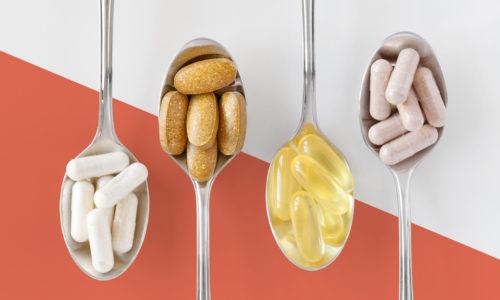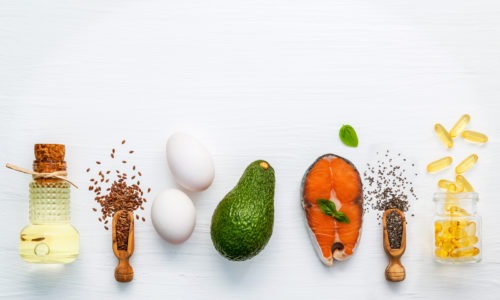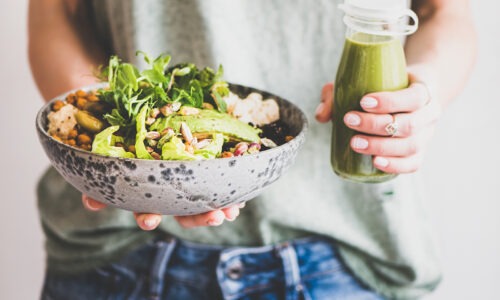 Family, Kids & Yourself
Family, Kids & Yourself  Healthy Eating Tips
Healthy Eating Tips  Love More
Love More
How Your Diet and Health May Impact Your Future Kids…Even Before You’re Pregnant
Home » Love More » How Your Diet and Health May Impact Your Future Kids…Even Before You’re Pregnant
We all know that what you eat during pregnancy matters, since your go-to salad isn’t just feeding you, it’s contributing to the health of your growing child. However, a new field of science called epigenetics is showing that salad might also affect your future child even if you’re not pregnant yet.
Why? Because diet and lifestyle can impact our health (and our future child’s health) on a genetic level.
How Epigenetics Impacts Health
Here’s the basic science. Epigenetics is the study of changes that occur by modifying gene expression, without modifying the actual gene itself. These changes to gene expression occur when external influences (yes, like diet and lifestyle) create a change in the cell’s environment, which ultimately can either alter the way the original gene is read (AKA expressed) or switch certain genes on or off. New research is showing that these epigenetic changes can be linked to higher likelihood of developing chronic diseases like obesity, asthma, diabetes, and heart disease.
And timing matters. Preconception is a key period for epigenetic imprinting. There is about a 90 day period of follicle maturation, and during this critical period, the egg follicles are highly susceptible to environmental inputs such as nutrition status, environmental exposures, and stress. This is largely due to methylation, an important chemical process that our body uses to ensure genes work properly. Essentially, methylation helps activate specific processes that support a variety of areas of health, from energy metabolism to cardiovascular health—and most importantly, regulating gene expression.
Preconception is also a critical period because once fertilization occurs, the methylation process kicks in to allow for the potential for all genes to be transcribed. Too little or too much methylation can lead to epigenetic changes that later impact disease risk.
Okay, so that’s the complicated science. Now, what are some ways we can eat for fertility and epigenetically boost our future kids’ health before they’ve even been conceived?
How to Eat and Live for Healthier Kids in the Future
-
1. Take methylated B vitamins

Roughly 60 percent of the US population has a genetic deficiency in their ability to methylate. B vitamins help push the cycle into gear, and taking the methylated form helps to ensure that your body is actually able to utilize the nutrients. Look for vitamins that contain the active form of the B vitamins such as methylate folate (5-MTHF), methylcobalamin (B12), Pyridoxal 5-Phosphate (B6) and Riboflavin 5 Phosphate (B2).
RELATED: The Supplements You Should Definitely Take During Pregnancy
-
2. Eat the right types of fats

Fat is essential for healthy hormone production and supports blood sugar balance. Focus on omega-3s found in fatty fish like salmon or tuna, flaxseed, walnuts, chia seeds, hemp seeds, and pumpkin seeds. Cook with olive or avocado oil.
-
3. Add in antioxidant and anti-inflammatory foods

Our eggs and reproductive organs (and all of the other parts of our bodies!) are made up of cells, so when we are talking about a diet to optimize fertility, we are talking about nourishing our body on a cellular level. This means incorporating more anti-inflammatory and antioxidant-rich foods to help reduce stress and damage to our cells. Foods rich in vitamins A,C, and E and selenium like berries, turmeric, ginger, leafy greens, brazil nuts, spirulina, and goji or mulberry can help protect DNA from oxidative damage.
-
4. Reduce everyday toxin exposure

Unfortunately, many chemicals found in our environment are endocrine disrupting, meaning that they could impact your hormonal balance, which in turn may impact your fertility. Additionally, your eggs have been exposed to all environmental conditions throughout your entire life, and these chemicals are often bioaccumulative. Opt for organic foods whenever possible and non-toxic skincare, cosmetic, and household cleaning products.
-
5. Reduce the big 3: alcohol, caffeine, and sugar

Alcohol and coffee both deplete the body of B vitamins, which as discussed above, are essential for proper methylation. These foods also contribute to hormonal imbalance either by increasing cortisol, disrupting blood sugar, or altering the gut microbiome. Try replacing a coffee with a turmeric latte, replace your afternoon candy with fresh fruit, and try to reduce alcohol to about four drinks per week.
Making changes to improve your diet and lifestyle early on will improve your own health and will not only help you in whatever phase of fertility you’re in (like a successful egg freezing cycle, IVF cycle or healthy pregnancy), but it can also have a positive impact on the future health outcomes of your child.
(Photos: Shutterstock)
-

Carlyn Rosenblum MS, RD, CLC, NLC believes that feeling your best starts with good nutrition—but also involves how you think, live, and show up for yourself physically and emotionally. Many women today feel out of sync with their bodies—especially when it comes to fertility. Carlyn works to help you uncover the hidden obstacles keeping you from feeling your best and teaches you how to listen and honor your body by focusing on what healthy means to you. Carlyn is a registered dietitian, with a Master’s Degree in Nutrition from NYU. She also obtained her CLC certification from the Healthy Children’s Project. Carlyn is the founder and CEO of MTHR Nutrition, a concierge nutrition counseling service for women. Carlyn dedicates her work to supporting women during the preconception, prenatal, and postpartum periods, which can often be a confusing and complicated time for nutrition. Carlyn takes a science-based, personalized approach to health. She believes that everyone is different, and nutrition should also take into account those differences. Find her at mthrnutrition.com and @mthrnutrition.
The Nutritious Life Editors are a team of healthy lifestyle enthusiasts who not only subscribe to — and live! — the 8 Pillars of a Nutritious Life, but also have access to some of the savviest thought leaders in the health and wellness space — including our founder and resident dietitian, Keri Glassman. From the hottest trends in wellness to the latest medical science, we stay on top of it all in order to deliver the info YOU need to live your most nutritious life.
DISCOVER MORE
RECENT ARTICLES

Want a sneak peek inside the program?
Get FREE access to some of the core training materials that make up our signature program – Become a Nutrition Coach.
Get Access"*" indicates required fields













































































































































































































































































































































































































































































































































































































































































































































































































































































































































































































































































































































































































































































































































































































































